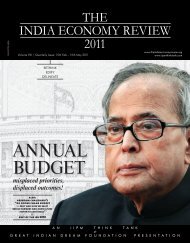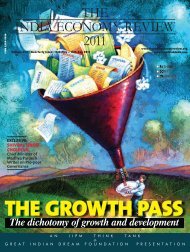Download - The India Economy Review
Download - The India Economy Review
Download - The India Economy Review
Create successful ePaper yourself
Turn your PDF publications into a flip-book with our unique Google optimized e-Paper software.
I NTEGRATED PLANNING<br />
<strong>The</strong> experience of the economy since<br />
independence has been reviewed extensively,<br />
and explanatory thesis forwarded<br />
to explain the effi cacies of economic<br />
planning and consequent economic development<br />
that has ensconced. 24<br />
In a study of economic performance<br />
carried out in the backdrop of development<br />
initiatives carried out in <strong>India</strong>,<br />
Datta-Chaudhuri points out that the ‘important<br />
question for developing societies<br />
is how to develop a mutually supportive<br />
structure of market and non-market institutions,<br />
which is well-suited to promote<br />
economic development. This makes normative<br />
development economics a diffi cult<br />
art.’ 25 nomic planning is to be carried out suggests<br />
such a revisit.<br />
Endnotes and Additional Thinking<br />
1 “World Bank Data on GNI” available<br />
at http://data.worldbank.org/indicator/<br />
NY.GNP.PCAP.CD (accessed 25<br />
That is also a reason as to why debates<br />
of the type referred to about economic<br />
planning bring in their relevance.<br />
<strong>The</strong> issues that were raised about economic<br />
planning retain their validity even<br />
as some time has elapsed from then when<br />
these were fi rst raised. In the years that<br />
made up the closing decades of the century,<br />
there has been evaluation of the<br />
pattern that economies with centralized<br />
planning planned their economic development<br />
and following which methodologies<br />
in use have been changed. <strong>The</strong>se<br />
have happened for both large economies<br />
and as also smaller ones. Such changes<br />
have occurred as a consequence of debates<br />
on the processes in use and economic<br />
planning has been one of these that<br />
have garnered attention. Revisiting early<br />
debates on economic planning in the<br />
context of the State and the market does<br />
provide a learning platform. <strong>The</strong> point of<br />
note is that issues raised in these early<br />
debates retain their validity. It is for this<br />
reason that revisiting these earlier debates<br />
retains relevance. An informed<br />
choice about options available on this<br />
date amongst the manner in which eco-<br />
th August<br />
2010). <strong>The</strong> South Korean State<br />
(Republic of South Korea) had adopted<br />
state planning for the economy beginning<br />
the early sixties (1962). <strong>The</strong> GNI<br />
per capita was $16,900 in 2005. It grew<br />
to $21,530 in 2008. <strong>The</strong> comparative<br />
data for <strong>India</strong> was $740 and $1,040 respectively<br />
for these two years.<br />
2 Hayek, F. A. (September 1945), “<strong>The</strong><br />
Use of Knowledge in Society”, <strong>The</strong><br />
American <strong>Review</strong>, Vol. XXXV, No. 4,<br />
pp. 520-530.<br />
3 Ibid., p. 520.<br />
4 Ibid., p. 520.<br />
5 Ibid., p. 520.<br />
6 Ibid., pp. 520-521.<br />
7 Ibid., p. 524.<br />
8 Ibid., p. 525.<br />
9 Ibid., pp. 526-527.<br />
10 Ibid., p. 526.<br />
11 Hayek, F. A. (1944), ‘<strong>The</strong> Road to Serfdom’,<br />
University of Chicago Press,<br />
Chicago, p.70.<br />
12 Ludwig Heinrich Edler von Mises<br />
(1881-1973) was an infl uential economist<br />
of the Austrian School.<br />
13 Mises, L. E., ‘Economic Calculation In<br />
the Socialist Commonwealth’, available<br />
at http://mises.org/pdf/econcalc.pdf (accessed<br />
23rd XXVII: Activities, 1940-1946, pp. 385,<br />
387, 388 referred to in Friedman Milton.<br />
(Spring 1987), John Maynard<br />
Keynes, Federal Reserve Bank of Richmond,<br />
Economic Quarterly, Volume<br />
83/2, p. 20.<br />
16 Ibid.<br />
17 Friedman, Milton. (Spring 1987), Op<br />
cit., p. 20.<br />
18 Friedman, Milton. (Spring 1987), Op<br />
cit., p. 20.<br />
19 Durbin, E. M. F. (December 1945),<br />
“Professor Hayek on Economic Planning<br />
and Political Liberty”, <strong>The</strong> Economic<br />
Journal, Vol. 55, No. 220, p. 370.<br />
Evan Durbin who taught at the London<br />
School of Economics during 1930-1945<br />
was a contemporary of Hayek who was<br />
at the School during 1931 and till 1950.<br />
Durbin was the Labour MP (United<br />
Kingdom) for Edmonton Constituency<br />
during 1945-1948.<br />
20 Durbin E. M. F. (1935), “<strong>The</strong> Importance<br />
of Planning’, New Trends in Socialism,<br />
pp. 149-150, referred to in<br />
Durbin, E. M. F. (December 1945), Op<br />
cit., p. 360.<br />
21 Durbin, E. M. F. (1945), Op cit, p.<br />
360.<br />
22 Durbin, E. M. F. (1945), Op cit, p.<br />
362.<br />
23 Durbin, E. M. F. (1945), Op cit, pp.<br />
366-367.<br />
24 Bardhan, Pranab. (1984), ‘<strong>The</strong> Political<br />
<strong>Economy</strong> of Development in <strong>India</strong>’,<br />
Basil Blackwell, Oxford.<br />
August 2010), p.17.<br />
25 Datta-Chaudhuri, Mrinal. (1990),<br />
14 Boettke, Peter, J. (1995), ”Hayek’s <strong>The</strong> “Market Failure and Government Fail-<br />
Road To Serfdom Revisited: Governure”, Journal of Economic Perspectives,<br />
ment failure in the argument against Vol. 4, No. 3, p. 38.<br />
socialism”, Eastern Economic Journal,<br />
Vol. 21, No. 1, p. 15.<br />
(<strong>The</strong> views expressed in the write-up are per-<br />
15 Donald Moggridge, ed., John Maynard sonal and do not reflect the offi cial policy or<br />
Keynes, <strong>The</strong> Collected Writings, Vol. position of the organization.)<br />
THE INDIA ECONOMY REVIEW<br />
41





